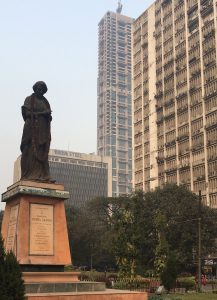Hindi Language Programme in Varanasi during summer 2019
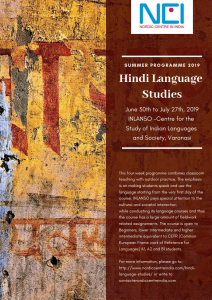 As one of its summer programmes, the Nordic Centre in India university consortium (NCI) organises a Hindi Language Programme in collaboration with the Centre for the Study of Indian Languages and Society (INLANSO) in Varanasi, from 30 June to 27 July 2019. This is a four-week-long intensive summer Hindi language course for students at A1, A2 and B1 levels of Hindi. The language programme focuses on the principle of combining classroom knowledge with outdoor practice with an emphasis on making students speak and use Hindi starting from the very first day of study. Special attention is paid to cultural and societal interactions so that students get the context of the language they are learning to speak. More information about all the 2019 NCI summer programmes.
As one of its summer programmes, the Nordic Centre in India university consortium (NCI) organises a Hindi Language Programme in collaboration with the Centre for the Study of Indian Languages and Society (INLANSO) in Varanasi, from 30 June to 27 July 2019. This is a four-week-long intensive summer Hindi language course for students at A1, A2 and B1 levels of Hindi. The language programme focuses on the principle of combining classroom knowledge with outdoor practice with an emphasis on making students speak and use Hindi starting from the very first day of study. Special attention is paid to cultural and societal interactions so that students get the context of the language they are learning to speak. More information about all the 2019 NCI summer programmes.
Lund University doctoral thesis on Workplace Heat Stress in Chennai
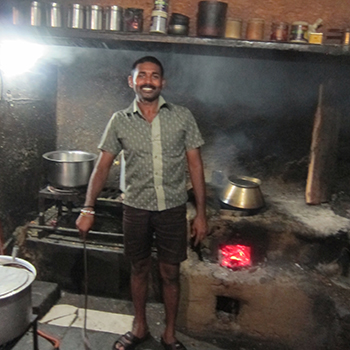
 On 23 February 2018, Karin Lundgren Kowacki at the Ergonomics and Aerosol Technology division within the Department of Design Sciences (IKDC) at Lund Institute of Technology (LTH), Lund University, defended her doctoral dissertation entitled ”The Heat is on: Evaluation of Workplace Heat Stress under a Changing Climate”. To a large part the thesis deals with workplace heat stress in India, and fieldwork has been carried out in Chennai. The faculty opponent was Dr Steve Rowlinson from the University of Hong Kong, China.
On 23 February 2018, Karin Lundgren Kowacki at the Ergonomics and Aerosol Technology division within the Department of Design Sciences (IKDC) at Lund Institute of Technology (LTH), Lund University, defended her doctoral dissertation entitled ”The Heat is on: Evaluation of Workplace Heat Stress under a Changing Climate”. To a large part the thesis deals with workplace heat stress in India, and fieldwork has been carried out in Chennai. The faculty opponent was Dr Steve Rowlinson from the University of Hong Kong, China.
One article – part of the compilation thesis – has been published in the November 2017 issue of International Journal of Biometeorology (”Climate change-induced Heat Risks for Migrant Populations working at Brick Kilns in India: a Transdisciplinary Approach), with a few co-authors including Dr. Pernille Gooch, Lund University, and Professors Vidhya Venugopal and Latha Anandh from the Department of Environmental Health Engineering, Sri Ramachandra University in Chennai. It deals with technical solutions including the use of sun-dried mud bricks and other locally “appropriate technologies” that could mitigate the worsening of climate change-induced heat. Socio-cultural solutions discussed for empowering the people who work at the brick kilns include participatory approaches such as open re-localization, and rights-based approaches including the environmental sustainability and the human rights-based approach framework.
Another article, also co-authored by Prof. Venugopal, was directly focusing on Occupational Heat Stress and Associated Productivity Loss Estimation at Workplaces in Chennai, and was published in the Global Health Action journal. its starting point was the summer of 2015, when India was hit by a scorching heat wave that melted pavements in Delhi and caused thousands of deaths, mainly among the most marginalized populations. One such group facing growing heat risks from both occupational and meteorological causes were migrant brick kiln workers. This study evaluated both current heat risks and the potential future impacts of heat caused by climate change, for the people working at brick kilns in India. A case study of heat stress faced by people working at brick kilns near Chennai where the situation is alarming since occupational heat exposure in the hot season from March to July is already at the upper limits of what humans can tolerate before risking serious impairment.
More information about Karin’s research with links to the dissertation articles.
Read an article in Swedish on the thesis in LTH-Nytt 1/2018, written by Jessica Sellergren
Fruitful NSAN visit to the Samtse College of Education in Bhutan
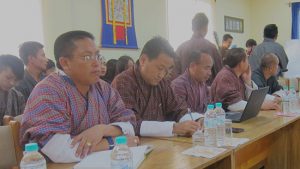 During the period 5-12 May 2017, the NSAN editor Lars Eklund visited Bhutan on invitation from the Royal University of Bhutan (RUB) and more specifically by its College of Education in Samtse (SCE). The planning for the visit originated in Lars meeting Swedish musicologist Johan Westman working at the Lu-Rig Centre for Music Education and Research.
During the period 5-12 May 2017, the NSAN editor Lars Eklund visited Bhutan on invitation from the Royal University of Bhutan (RUB) and more specifically by its College of Education in Samtse (SCE). The planning for the visit originated in Lars meeting Swedish musicologist Johan Westman working at the Lu-Rig Centre for Music Education and Research.
Samtse College of Education is one of eight Bhutanese colleges at different locations in the country, under the umbrella of RUB. It was established already in 1968 as the Teachers Training Institute.
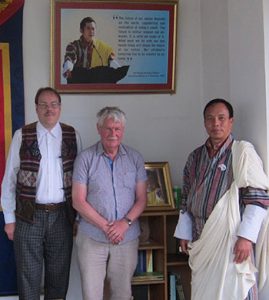
Currently SCE has external linkages with a number of European, American and Australian universities, including TERI University in Delhi and Aalborg University in Denmark, but till now no Swedish universities, and that became the main purpose of Lars’ visit to broker more connections.
Lars was invited to hold a seminar (photo above) for the faculty and students on important research fields common to Sweden and Bhutan, presenting information about Nordic PhD theses and Swedish research projects related to Bhutan – mostly within natural and agricultural sciences, and providing concrete suggestions regarding specific Swedish university institutions in the fields of social science and humanities that might be of interest for SCE.
During his stay in Samtse he also held separate meetings with the professor at the different centres, and with the SCE President, Dr. Dorji Thinley. These meetings were fruitful and immediately a connection was made between the Dept. of Mathematics at SCE and a Matematics department at a Swedish university.
On his final day in Bhutan, in the capital Thimphu, Lars had a 45 minutes meeting with the Vice Chancellor of Royal University of Bhutan, Nidup Dorji.
Read Lars complete report from the Bhutan visit.
